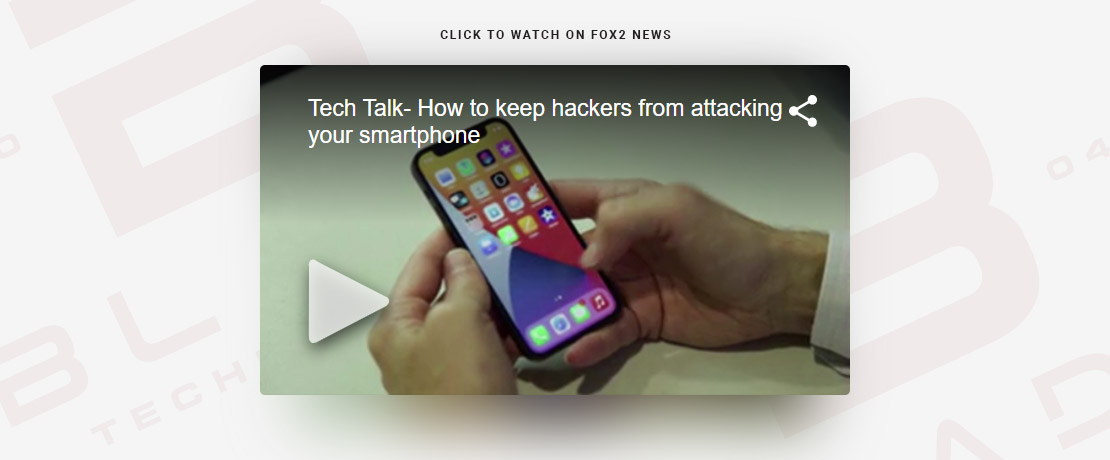Jan 13, 2021

Your cell phone is a vital piece of technology you use every single day. From confidential emails to credit card numbers, it contains everything essential to you – and to hackers.
Scott Shaffer, Blade Technology’s Chief Security Officer, recently appeared on Fox 2 News to discuss what you can to do to protect your mobile devices.
Your Phone is a Personal Data Mine
Using your cell phone for texting and calling is what phones were originally intended for. As they developed, the phone’s features became more complex.
Today, we use our phones to keep family recipes, banking information, and important passwords saved. Our phones are a collection of our life’s most important facts and moments, making it a gold mine for hackers.
How Can Hackers Gain Access To Your Phone?
Hackers can gain access to your cell phone and personal data a variety of ways. Through hacking software, hackers can start keylogging or set up a trojan malware to collect your personal information.
Keylogging is the process of tracking the keys a user presses on their phone, giving way to all passwords and text messages. Trojans are malware that is disguised in your phone and extract your credit card or personal information.
The most well-known form of cell phone attacks are phishing attacks. These attacks attempt to impersonate a company or trusted person to gain personal information and access to accounts.
Once they’ve gotten through your phone’s security software, hackers will attempt to access your sensitive data. Information, such as important passwords, will then be located and stored for their future use.
Some hackers will even attempt to gain access to your device’s cameras through a process called camfecthing. This is when a hacker has access to your phone’s camera without your knowledge.
How Do I Protect My Phone From Hackers?
As previously stated, your phone is a gold mine for hackers seeking information. We cannot do everything to stop it from happening, but we can start to use our mobile devices safely with these steps.
Browse Public WIFI Safely
Often seen in restaurants such as McDonalds, Panera Bread, or even at hotels, public wi-fi seems like a harmless idea. It usually does not require a password to enter, as most businesses offer it as a customer courtesy.
Hackers will take advantage of this courtesy, performing what is called the “Man in the Middle Act”. Utilizing an automatic device, called the Wi-Fi Pineapple, hackers can scan for users’ valuable information.
To prevent these attacks, avoid joining public networks you do not know. Hackers can imitate these networks and choosing to join could make your information at risk. If you must use public wi-fi, utilize a virtual private network (VPN). A VPN works to encrypt your information, making it safe from hackers looking to target public wi-fi users.
Stay Away from Malicious Apps
Utilizing applications, like popular game applications, are a great way to gain access to your information. Once downloaded, the malicious apps with begin to collect all the data it can get its hands on.
To prevent this, only download applications from the Apple (iOS users) or Google Play (Android users) store. These stores screen all applications for malware, so they have a lower chance at containing malicious applications. Even if you download from the Apple or Google Store, resist the urge to click on pop-up ads.
Keep Your Phone’s Software Updated
Periodically, your phone’s security software will call for an update. It’s important to update your device as soon as a new update is available, as the newer version of your software often contains advancements in the security software.
Avoid Public Charging Stations
Another courtesy item that needs precaution is public charging stations. Our phone’s USB cord not only charges our phones but can also send our personal information to hackers if they’ve infected the connection plug with malware.
Prevent your data from being exposed via public charging station by utilizing a normal wall plug-in charge or purchase a portable charging block. Without being able to see exactly where you’re plugging your phone into, you’re putting yourself at risk to data breaches.
How to Tell & What To Do if Your Phone is Hacked
If you have sensed something is off with your phone, there’s a high chance that someone has hacked into your device.
Look for suspicious activity, such as apps or text message you don’t recognize. Your phone’s battery might die faster or become hot when being used. If the phone is operating at a slower speed, it will have to use more energy and power to operate normally. Additionally, pop-ups appearing on your phone are a sign that you could have spyware or malware in your device.
When you think your phone has been hacked, here are a few things you should consider doing:
- Change all your passwords and monitor for changes
- Reset your phone to factory settings, making your phone a clean slate
- Utilize trusted malware detecting software to detect malicious applications
More Tech Talk from Fox2Now
Blade Technologies in St. Louis is honored to be a regular contributor to Fox2Now's Tech Talk series. For the latest information on what's new in tech and how to keep you and your devices safe, check out more of the Tech Talk series.
Tech Talk Series
You can also learn more about Blade’s cybersecurity services in St. Louis or get in touch with our team.
Contact Us